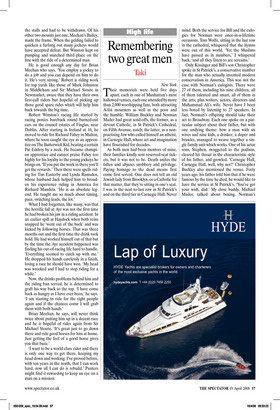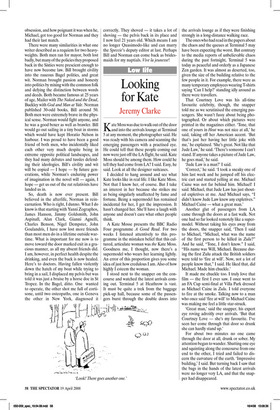Remembering two great men
Taki
New York Their memorials were held five days apart, each in one of Manhattan’s most hallowed venues, each one attended by more than 2,000 worshipping fans, both attracting A-list mourners as well as the poor and the humble. William Buckley and Norman Mailer had great send-offs, the former, as a devout Catholic, in St Patrick’s Cathedral, on Fifth Avenue, natch; the latter, as a nonpractising Jew who called himself an atheist, in Carnegie Hall, where art and imagination have flourished for decades.
As both men had been mentors of mine, their families kindly sent reserved-seat tickets, but it was not to be. Death unites the fallen and abjures snobbery and privilege. Paying homage to the dead means first come first served. One does not tell an old Jewish lady from Brooklyn, or a Catholic for that matter, that they’re sitting in one’s seat.
I was in the next-to-last row in St Patrick’s
and on the third tier in Carnegie Hall. Never
mind. Both the service for Bill and the eulogies for Norman were once-in-a-lifetime occasions. Tom Wolfe, sitting in the last row in the cathedral, whispered that the hymns were out of this world. ‘Yet the Muslims have passed us in numbers,’ I whispered back, ‘and all they listen to are screams.’ Only Kissinger and Bill’s son Christopher spoke in St Patrick’s, a conservative number for the man who actually invented modern conservatism in America. This was not the case with Norman’s eulogists. There were 27 of them, including his nine children, all of them talented and smart, all of them in the arts; plus writers, actors, directors and Muhammad Ali’s wife. Never have I been less bored by listening to 27 speakers. In fact, Norman’s offspring should take their act to Broadway. Each one spoke on a particular subject about their father, but with one unifying theme: how a man with six wives and nine kids, a drinker, a doper and brawler, managed to weave together a single family unit which works. One of his actor sons, Stephen, swaggered to the podium, cleared his throat in the characteristic style of his father, and growled, ‘Carnegie Hall, Carnegie Hall, well, why not?’ Christopher Buckley also mentioned the venue. Forty years ago, his father told him that if he were famous by the time he died, he would like to have the service at St Patrick’s. ‘You’ve got
your wish, dad.’ My close buddy, Michael Mailer, talked about boxing, Norman’s obsession, and how poignant it was when he, Michael, got too good for Norman and they had their last match.
There were many similarities in what one writer described as a requiem for two heavyweights. Both men ran for mayor, both lost badly, but many of the policies they proposed back in the Sixties were prescient enough to have now become law. Bill brought civility into the raucous Bagel politics, and great wit. Norman brought passion and honesty into politics by mixing with the common folk and defying the distinction between words and deeds. Both became famous at 25 years of age, Mailer with The Naked and the Dead, Buckley with God and Man at Yale. Norman published 30-odd books, Bill around 50. Both men were extremely brave in the physical sense. Norman would fight anyone, and he was a good boxer as well as brawler. Bill would go out sailing in a tiny boat in storms which would have kept Horatio Nelson in harbour. I was proud to have been a good friend of both men, who incidentally liked each other very much despite being in extreme opposite political landscapes, and they had many debates and tussles defending their ideologies. Bill’s civility and wit will be copied — I hope — by future generations, while Norman’s enduring power of imagination in the novel will — again, I hope — get us out of the rut relativists have landed us in.
So, death is now ever present. Bill believed in the afterlife, Norman in reincarnation. Who is right, I dunno. What I do know is that starting with Yanni Zographos, James Hanson, Jimmy Goldsmith, John Aspinall, Alan Clark, Gianni Agnelli, Charles Benson, Nigel Dempster, John Goulandris, I have now lost more friends than most men do in a lifetime outside wartime. What is important for me now is to move toward the door marked exit in a gracious manner, as all my absent friends did. I am, however, in perfect health despite the drinking, and even the back is now healed. Here’s to doctors. Having fallen violently down the hatch of my boat while trying to bring in a sail, I displaced my pelvis but was told it was just a bruise by a horse doc in St Tropez. In the Bagel, ditto. One wanted to operate, the other shot me full of cortisone, until two osteopaths, one in Geneva the other in New York, diagnosed it correctly. They shoved — it takes a lot of shoving — the pelvis back in its place and I now feel 21 years old. Which means I am no longer Quasimodo-like and can marry the Speccie’s deputy editor at last. Perhaps Bill and Norman can come back as bridesmaids for my nuptials. Vive la jeunesse!



















































































 Previous page
Previous page